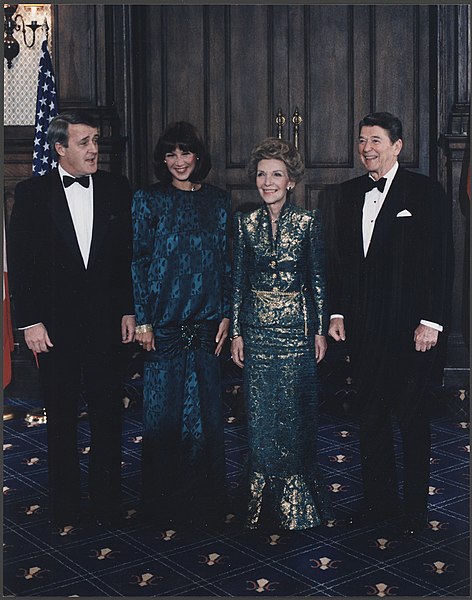In the free-to-cheapskates teaser from this week’s dispatch from The Line, nice words are said in memory of the late Brian Mulroney, former Prime Minister of Canada:

Prime Minister Brian Mulroney, Mila Mulroney, Nancy Reagan, and President Ronald Reagan at the “Shamrock Summit”, 18 March, 1985.
Photo from the Ronald Reagan Presidential Library via Wikimedia Commons.
Brian Mulroney died last week. He was 84.
The first thing you could be forgiven for taking away from the news coverage is how far we have fallen.
Brian Mulroney did big things. Negotiating Free Trade. Fighting Apartheid. Getting the Americans to crack down on acid rain. Comprehensive tax reform that saw the old Manufacturers’ Sales Tax (which taxed productivity) replaced with the GST. Sending Canadians to war in Desert Storm. Striking the Royal Commission on Aboriginal People which led to many of the legal advancements Indigenous communities were able to make through the 90s and into this century.
Even when he failed, as he did at Meech Lake, Brian Mulroney was trying to do something fundamentally transformative in Canadian politics.
And nobody who came after him had anywhere near that kind of guts. Not one of them.
There are things people will gripe about when it comes to Mulroney. Karlheinz Schreiber will be pretty close to the top of that list. Mulroney also tends to poll pretty poorly out west for any number of reasons ranging from a perceived over-emphasis on Quebec via Meech Lake and Charlottetown, to awarding the CF-18 maintenance contract to Montreal’s Canadair after (allegedly) promising it to Winnipeg-based Bristol Aerospace.
Mulroney was not beloved when he left office, to put it mildly. His party was basically annihilated in 1993, and the Canadian conservative movement shattered — it has still, in some ways, yet to fully recover. These are facts about which no one made more, or better, jokes than Mulroney himself. But that fall from esteem was almost never seen internationally. As he watched his contemporaries pre-decease him, Canadians got to see how respected the man was on the world stage. Mulroney was asked to eulogize American presidents Ronald Reagan and George H.W. Bush as well as British prime minister Margaret Thatcher. In this, Mulroney embodied one of the greatest cultural cynicisms of this country: sometimes, the only way for us to claim a Canadian as one of our own is to first watch them make it abroad.
Mulroney’s great triumph is free trade. Yes, because it meant jobs for millions of Canadians. Yes, because it locked us into an economic pact with the world’s powerhouse economy. But also because, in doing it, he went head-on at one of this country’s great cliches: the idea that reflexive, Laurentian, anti-Americanism was somehow a basis for governing instead of just the hallmark of a deeply insecure cultural elite.
Nobody is picking those fights now. Nobody is taking on the big battles to remake the country. We have been treated to almost 30 years of some of the pettiest, small-ball sniping imaginable. Various wedge issues are dusted off by either side, and hurled like stale buns at their opponents. Culture wars are imported for the purposes of giving our political class something about which they can feign moral outrage. Our leaders are afraid of big things either because they’re hard, or because they are unlikely to pay off in a single four-year election cycle. Mulroney is, arguably, the last Canadian prime minister whose vision of what Canada is, or could be, was not limited by a four-year horizon.
We are a serious country that is not led by serious people. And that is brought into focus when you lose a serious person.
Whatever his flaws, Brian Mulroney was a serious person.
The Line‘s editors say that Mulroney wasn’t well liked on leaving office, but the utter obliteration of the Progressive Conservatives in the 1993 federal election can’t be completely blamed on him. His successor as PC leader, Kim Campbell, went out of her way to alienate western conservatives and libertarians during her brief time in office and during the election campaign that followed. She became Prime Minister with a surprising level of tentative support that she jettisoned in record time, taking her party from a majority in the House of Commons to two (2) seats — only one other Canadian PM has ever been defeated in their own riding (Arthur Meighen … but he had it happen twice, first in 1921 and again in 1926).









